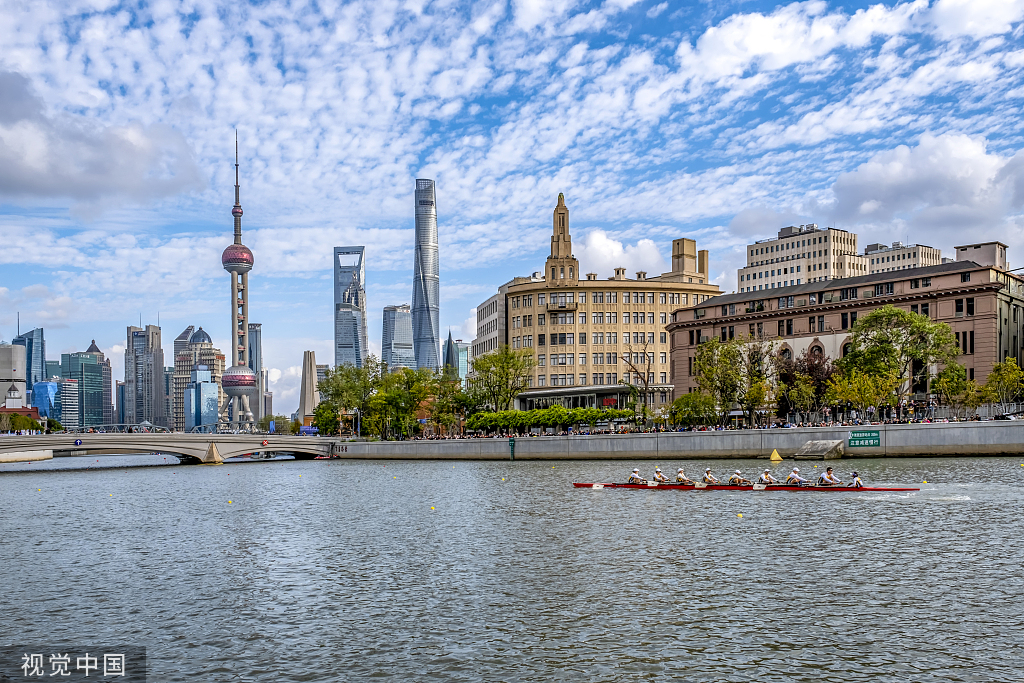Shanghai a ghost city a figment of imagination
By Lin Shujuan | China Daily | Updated: 2023-09-16 09:20

Sitting in an office in downtown Shanghai and writing a rebuttal of the rumors that China's largest city has turned into a ghost town seems like using a sledgehammer to crack a nut. Rebutting such absurd claims is simple: open the window, use your mobile phone camera to click a few random photographs, upload them on social media platforms, and your job is done.
In fact, many have done a better job by clicking photos and videos of Shanghai's immensely busy streets to rebut "independent journalist" Michael Yon's tweet on X (formerly Twitter) on Monday. Yon's tweet features three photos, which appear to show desolate roads and an empty Starbucks outlet in Shanghai's Lujiazui financial area, one of the city's most prosperous areas. Yon said the photos were taken by a friend on Monday and indicate "deep trouble" for the Chinese economy.
Yon doesn't live in Shanghai or know the city well enough to have the knowledge of how a specific location looks like at a specific time of the day or night. Only office employees working in the area, some of whom can be seen in the photos, know it's not a good idea to take the overpass on a sunny, smothering hot morning on Monday to see or show what the city actually looks like.
Ji Chun, a lawyer whose office is located at Shanghai World Financial Center, said the office buildings in the Lujiazui financial area are interconnected by overpasses, like the one featured in the photos, and many underpasses.
Moreover, only local drivers and residents know the Pudong entrance to Yan'an East Road Tunnel has been closed to traffic and pedestrians since Oct 24, 2022, when the Pudong Avenue Tunnel, a major underground throughway nearby, was opened to traffic. Hence the empty street during office hours — which seemed weird to Yon and his traveling friend.
An empty Starbucks, with not even one barista, at 9 am may be an indicator of a slowing economy. But that is not necessarily the case with Shanghai, which has more than 8,000 coffee shops which can deliver coffee to customers within minutes of receiving online orders. At least 10 coffee shops, including three Starbucks outlets, are located within a radius of less than 300 meters from where Yon's friend took the photos. Besides, it's not the right time for coffee or, to better put it, to sneak out for a cup of coffee when most people have just arrived at the office to start work.
For those with an urgent need for caffeine, an online order is a better choice. And yet Yon and his friend didn't care to think before jumping to a conclusion based on what they chose to see. Yon's friend didn't even bother to include the busy pedestrian crossing below the overpass. Nor did Yon care to question the obvious but something the photos don't show. When his friend sent him the photos and told him, the Chinese economy is "in deep trouble", Yon swallowed it hook, line and sinker and shared them on X.
Of course, the tweet has struck a chord with many.
In his report published in Newsweek, Andrew Stanton said that many residents have disputed the notion that Shanghai has turned into a ghost town. Yet it didn't stop Stanton from agreeing with what Yon wrote on X. Stanton has introduced new evidence, which seems more "convincing", citing economists' concerns that China's economic growth has slowed down after the country lifted COVID-19 prevention and control measures, regardless of the fact that China's economy has since continued to recover.
In the first half of the year, China's GDP grew by 5.5 percent year-on-year, significantly faster than last year's 3 percent, and the International Monetary Fund has forecast that China's economy will grow by 5.2 percent this year, and its contribution to global economic growth will increase to one-third of the total.
Foreign Ministry spokeswoman Mao Ning cited the statistics at a regular news conference on Tuesday in response to global concerns over the Chinese economy. "It seems that various 'China collapse theories' appear every once in a while, but the fact is that China's economy has not collapsed. On the contrary, the 'China collapse theory' has repeatedly collapsed," she said.
That's the message for Yon and his friend.
The author is a writer with China Daily.
linshujuan@chinadaily.com.cn
























